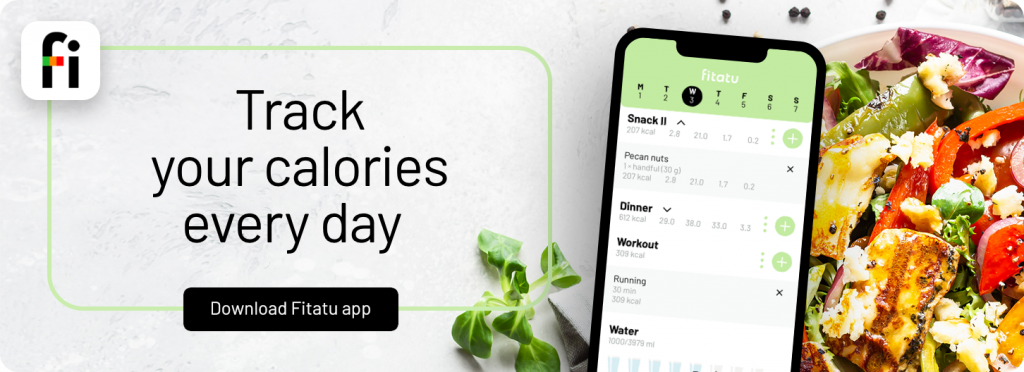Excessive sugar consumption in the diet – time to tackle this issue

In this article, we will present new food labeling rules in the USA: we take a closer look at the topic of added sugar. You will learn about recommendations and find out what sugar intake in the diet is permissible, as well as the consequences of exceeding it. We will advise you on how to manage sugar control with Fitatu®.
Civilization diseases such as overweight, obesity, type 2 diabetes, or hypertension are a serious problem not only in the USA but in most highly developed countries. The development of these diseases is associated with a lack of physical activity and nutritional errors, including very high sugar consumption. Research shows that most of the sugars we consume do not come from products where they naturally occur (e.g., fruits), but from sugar added during production processes. Learn how excessive sugar consumption in the diet affects your body and how it can be prevented.
Added sugars — why they deserve a closer look
First, it’s important to understand what added sugars are. This term refers to all sugars (mono and disaccharides) that do not naturally occur in the product and have been added to food during production. Reading the labels of such products, you will find among others: sugar, maple syrup, glucose-fructose syrup, honey, lactose, fructose, corn syrup, cane and coconut sugar, and fruit juice concentrates.
Change in nutrition labeling rules in the USA
Americans have decided to help their citizens control sugar intake with their diet and have changed the food labeling rules. In the European Union countries, Australia, India, Canada, and earlier also in the USA, it is mandatory to indicate the amount of carbohydrates and sugar in 100 g/ml of the product or per serving. There is no obligation to divide sugar into that naturally occurring in the product and added sugar. The United States has taken a step forward and mandatorily included the amount of added sugar on the label. Additionally, information is shown on what percentage of the daily added sugar requirement is met by a serving of a particular product. In this way, you can find out that despite not exceeding calories, consuming products rich in added sugar exceeds its recommended daily amount. This is a common problem not only for Americans but also for residents of Western Europe.
Sugar consumption in the diet – recommendations
Every country has its own recommendations regarding the amount of sugar that should be provided with the diet to maintain health. Of course, these recommendations apply to healthy people; if you suffer from chronic diseases, it is essential to consult your diet with a doctor and/or a dietitian specialist.
USA
In the States, it is assumed that added sugars should not exceed 10% of the consumed energy per day. For an average person consuming 2000 kcal/day, this amount should not exceed 200 kcal, which is 50 g of sugar.
UK
In the United Kingdom, recommendations for sugar intake have been issued by Public Health England (PHE), part of the Department of Health and Social Care. According to these guidelines, the amount of added sugars (i.e., sugars added to foods or beverages, and sugars naturally present in honey, syrups, and fruit juices) in an adult’s diet should not exceed 5% of their total daily energy intake from food.
For an average adult who requires about 2000 calories per day, this means that sugar intake should not exceed about 30 grams per day. This is roughly equivalent to 7 teaspoons of sugar.
These are general recommendations, and individual needs may vary depending on factors such as age, gender, physical activity level, and overall health status. The recommended sugar limits are lower for children and adolescents. It’s important to remember that individuals with specific health issues or nutritional needs should consult their diets with a doctor or dietitian.

How to control sugar intake in your diet with Fitatu®
In the Fitatu® app, you can monitor the amount of sugar consumed each day. Simply click the lower bar indicating consumed calories, which will take you to the summary. There you will find information on how many grams of sugar have already been eaten. If you’re interested in the topic, we encourage you to read about facts and myths regarding sugar.
How to reduce sugar intake
Reducing sugar doesn’t have to be difficult. Just read the ingredients and choose those that use low-calorie sweeteners such as erythritol and xylitol instead of sugar. You can read more about them here. Replace sweet drinks with water or unsweetened tea or coffee. Limiting sugar can also be aided by the Fitatu® challenge – 30 days without sweetening drinks or 21 days without sweets, join the challenge! You’ll find it in the “Motivation” tab.
Fitatu® Support Group
Reaching your goal is easier with the support of others! Join our Fitatu Facebook group and achieve your goals together with other Fitatu® app users. With the group members, you can share your results every day and motivate each other to keep going.
Fitatu® App
Not yet familiar with Fitatu®? Download the app from the Play Store or Apple Store and start taking charge of your health with us! Do you want to have access to all the features? Go for Fitatu® Premium! For blog readers, we have a special discount code: SUGAR-35. Go to https://www.fitatu.com/app/order-and-payment and claim a 20% discount on Fitatu® Premium annual plans. The code combines with other promotions.
What else can you find in Fitatu® Premium?
- Over 2,000 recipes plus dozens of new ones every month,
- additional intermittent fasting plans,
- possibility to create shopping lists,
- 6 pre-prepared meal menus,
- filtering of products and recipes,
- more synchronization with fitness apps,
- access to the app in the web version,
- no adverts!
Bibliography:
- https://www.fda.gov/food/new-nutrition-facts-label/added-sugars-new-nutrition-facts-label
- https://www.pzh.gov.pl/wp-content/uploads/2020/12/Normy_zywienia_2020web-1.pdf
- https://www.biznes.gov.pl/pl/portal/001770#2
- https://eur-lex.europa.eu/legal-content/PL/TXT/?uri=celex:32011R1169
- https://www.indiafilings.com/learn/food-labelling-regulations-in-india/
- https://www.foodstandards.gov.au/code/Pages/default.aspx
- The sweet danger of added sugars, Luigi Paglia, European Journal of Paediatric Dentistry vol. 20/2-2019
- Witek, K.; Wydra, K.; Filip, M. A High-Sugar Diet Consumption, Metabolism and Health Impacts with a Focus on the Development of Substance Use Disorder: A Narrative Review. Nutrients 2022, 14, 2940. https://doi.org/10.3390/nu14142940
- Herman MA, Birnbaum MJ. Molecular aspects of fructose metabolism and metabolic disease. Cell Metab. 2021 Dec 7;33(12):2329-2354. doi: 10.1016/j.cmet.2021.09.010. Epub 2021 Oct 6. PMID: 34619074; PMCID: PMC8665132.





